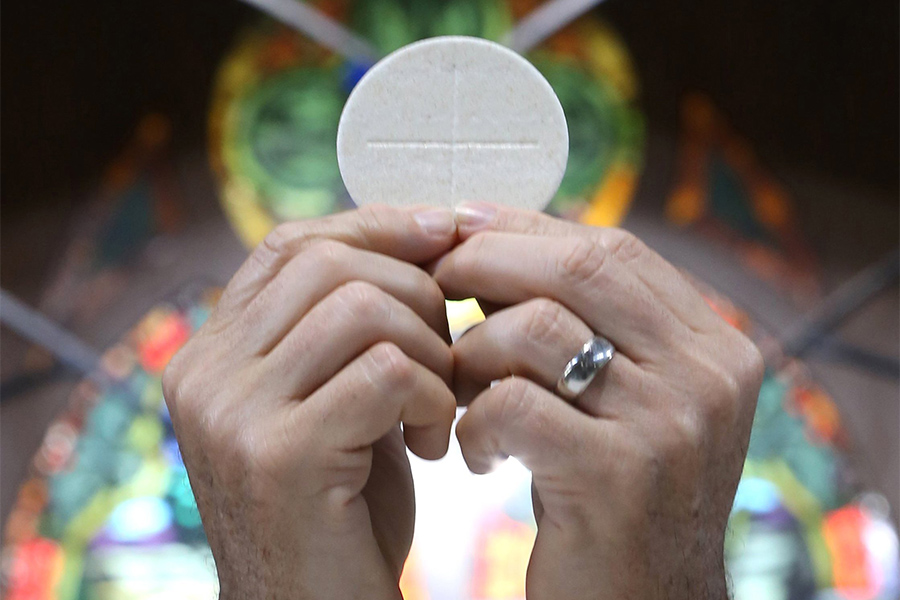Long ago, in the days before the Second Vatican Council, those who felt a certain distaste for the Catholic faith were wont to speak of their papist neighbors as “mackerel snappers.”
The silly term was rooted in Catholics’ centuries-old discipline of abstaining from meat on Fridays. As that discipline disappeared, so did the insult. Yet “mackerel snappers” just might make a comeback in anti-Catholic circles, or at least in England and Wales, where, since Sept. 16, 2011, all Catholics have been obligated once again to forgo steaks on Fridays, and instead dine on less fleshy fare.
In May 2011, the bishops of England and Wales, wrote: “In accordance with the whole Church, the Bishops’ Conference wishes to remind all Catholics in England and Wales of the obligation of Friday Penance. The bishops have decided to re-establish the practice that this should be fulfilled by abstaining from meat. Those who cannot or choose not to eat meat as part of their normal diet should abstain from some other food of which they normally partake.”
In 2022, they reiterated that commitment, writing, “In this way we dedicate to God the pressing need for us all to live more simply.”
Why the change? And why should Catholics in America be concerned with what British Catholics eat on Fridays?
The answer starts with a brief history of Friday abstinence, the first mention of which comes in the Didache, a first-century compilation of Christian teachings. There, Christians are enjoined to fast on Wednesday and Fridays. The Wednesday fast soon fell out of fashion, but the Friday fast continued for nearly two millennia, with Christians commemorating the day of the Lord’s death through prayer, fasting and abstinence from meat and fowl.
The reason for that, said Rob Corzine, vice president for academic programs at the St. Paul Center for Biblical Theology, is that “the church has always understood that every week is a microcosm of the liturgical year. Every Friday is a little Lent, and every Sunday a little Easter. The two are inseparably linked.”
The church’s teaching on that point hasn’t altered. It has never changed its insistence upon Friday as a day of penance any more than it has changed its insistence upon Sunday as a day of worship. What it has changed, however, is its insistence upon what form that penance should take.
In 1966, Pope St. Paul VI issued the apostolic constitution “Paenitemini” (“On Fast and Abstinence”). There, he reiterated that “by divine law all the faithful are required to do penance,” and that “abstinence is to be observed on every Friday which does not fall on a day of obligation.”
He went on, however, to grant national episcopal conferences the authority to “substitute abstinence and fast wholly or in part with other forms of penitence and especially works of charity and the exercises of piety.”
The reasoning behind the change was that while abstaining from meat was a penitential act in wealthy nations, it was a way of life in poorer countries. Giving bishops the freedom to adapt the required penance to best suit their flocks’ circumstances was a concession to the changing realities of the Catholic world. It also reaffirmed the penitential nature of Friday, underlining the importance of the faithful uniting themselves with Christ in his passion through meaningful acts of penance.
That was the theory. In practice, it didn’t quite work that way.
Instead of insisting upon abstinence as an act of solidarity with the poor, many affluent nations’ bishops conferences, including those in Britain and the United States, made the traditional practice of meatless Fridays optional, allowing Catholics to choose their own penance instead. Catholics in those countries took that freedom a step further, interpreting the change not simply as an abrogation of meatless Fridays, but as an abrogation of any Friday penance.
The ambiguous language of the U.S. bishops’ 1966 document on the topic didn’t help matters. Nor did the timing. The 1983 Code of Canon Law attempted to clear up the confusion over Friday penance, stating in Canons 1250 and 1251, that “The penitential days and times in the universal Church are every Friday of the whole year and the season of Lent. Abstinence from meat, or from some other food as determined by the Episcopal Conference, is to be observed on all Fridays, unless a solemnity should fall on a Friday.”
By that point, however, the proverbial die was cast. Although a pious few continued to forgo meat or perform some other act of prayer or sacrifice on Friday, the majority of Catholics in the West treated the day just like any other.
Times, however, are changing.
In 2009, then-ordinary of Steubenville, Ohio, Bishop Daniel Conlon, issued a pastoral letter requesting all Catholics in the diocese resume abstinence from meat on Fridays. Two years later, the Bishops of England and Wales did likewise. And they did so, for similar reasons.
First, both issued their letters as a reminder to Catholics that Fridays should be observed as days of penance. At the time, Bishop Conlon told Our Sunday Visitor, “Despite Pope Paul VI’s injunction that Catholics substitute another penitential practice for abstaining from meat on Fridays, most Catholics were not doing anything.”
Second, both wanted to stress the importance of ascetic practices. “It seems to me that the call to asceticism is even greater for those who live in a materialistic society. It’s good for the soul, and it’s good for the body,” said Bishop Conlon, who in 2011 was assigned to lead the Diocese of Joliet, Illinois, and who resigned in 2020 after taking medical leave.
Third, they wanted to revive Friday abstinence as a means by which Catholics bear common witness to the culture. Wrote Britain’s bishops, “By the practice of penance every Catholic identifies with Christ in his death on the cross. … When this is visible in the public arena, then it is also an important act of witness.”
Finally, at least in England and Wales, the bishops reinstituted the practice as a means of strengthening Catholic identity. From the bishops’ letter: “The bishops wish to re-establish the practice of Friday penance in the lives of the faithful as a clear and distinctive mark of their own Catholic identity. They recognize that the best habits are those acquired as part of a common resolve and common witness.”
Since then, other U.S. bishops, including Bishop Edward Weisenburger of Tucson, Arizona (while bishop of Salena, Kansas), and Bishop Glen John Provost of Lake Charles, Louisiana, have encouraged their faithful to return to year-round Friday abstinence.
Which brings us back to the question — what does this have to do with the rest of us?
Simply put, all those reasons for abstaining from meat on Fridays are as valid for Catholics in Sacramento as they are for Catholics in Sussex.
When the name of the game is “Choose Your Own Penance,” many of us will end up not choosing anything at all. When it’s a settled question, however, that Friday penance means abstaining from meat, the penance is much more likely to be observed. Also, because it’s observed at every meal, it keeps one conscious of the day’s particular charism.
Then, there remains the fact that abstinence is good for us.
“In a fully integrated human being, the soul is in charge of the body,” said Father Edward Connolly, a priest of the Diocese of Allentown, Pa. “Abstaining from meat and other foods reminds us of that.”
Likewise, abstinence enables all Catholics to become public witnesses to the faith.
“Like our Jewish brothers who keep a kosher diet, it’s a visible, tangible way we can testify to the fact that our Lord died for us on a Friday,” said Father Connolly.
Last, but not least, abstaining from meat is still the U.S. bishops’ stated preference for how Catholics should observe Fridays.
As they wrote in 1966: “Even though we hereby terminate the traditional law of abstinence binding under pain of sin as the sole prescribed means of observing Friday, we give first place to abstinence from flesh meat. We do so in the hope that the Catholic community will ordinarily continue to abstain from meat by free choice as formerly we did in obedience to Church law.”
Perhaps it’s time to take them up on their invitation.
Read More Commentary
Copyright © 2023 OSV News







